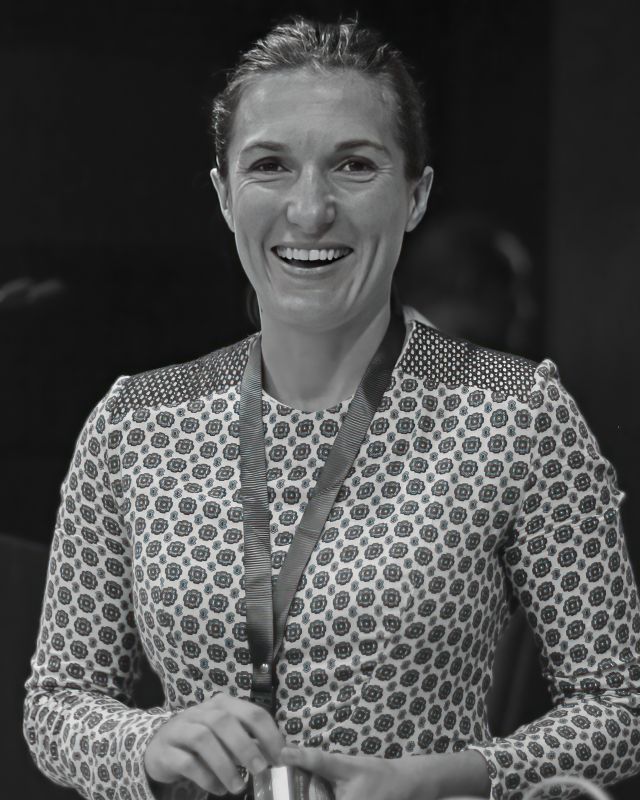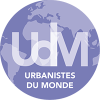Portrait

Noémie Fompeyrine - GLM 2015 - Project Manager at the Resilience Mission, General Secretariat of the City of Paris
Posted on | Alumni Portrait
Portrait by Juliette Christophe
Can you tell us a little about your background? What led you to the public service? To the resilience mission?
After graduating from high school, and before entering Sciences Po, I left for a year and worked in a social center in a barrio joven in Lima, Peru. At that time, the Governing the Large Metropolis master's degree did not exist and I would not have named the activities of my neighbors "informal economy", nor would I have dared to use the word "vulnerability" to describe the situations I observed! Nevertheless, my interest in access to education, health, transportation, energy, and public services in general in large metropolises, goes back to this stay.
Back in Paris, I continued my studies and did internships in my third year between Madrid, Paris and Bangkok, in a company, a think tank and a CNRS research center. During my master's degree, we developed, with friends, an association that organized events (festivals, conferences, aperitif-debates, screenings) and ran a webmagazine to think about and celebrate urban cultures. It is still called " NOISE, Le bruit de la ville ". This experience was also foundational and allowed me to acquire skills that are still useful to me.
I did my end-of-studies internship in the office of the deputy mayor of Paris in charge of transport, travel, roads and public spaces. There, I discovered the institution, the field of mobility and politics. I chose to write a professional essay on the governance of mobility at night in Paris. This approach led me to delve deeper into a current theme, to contribute to the firm's reflections on the subject, and to reach out to people with whom I still interact professionally today. I would therefore advise, if the exercise still exists, current students to take part in it!
Following my internship, the director of the firm offered me a position. For a year, I followed and contributed to the emergence of several public policies: the organization of the first two "car-free days" in Paris, the monthly pedestrianization of the Champs-Elysées, a "without my car" challenge, and the follow-up of files as diverse as the transformation of the ring road, the urban projects around the major train stations, the participative budget, the experimentation of autonomous vehicles, etc. My role was therefore to coordinate projects, to advise the elected representative, and to take a forward-looking view of certain issues.
While working on one of them, I met the Senior Resilience Officer of the City of Paris, who had been appointed a few months earlier and was looking for someone to accompany him in the development of an urban resilience strategy, as part of the "100 Resilient Cities" network. Since July 2016, I have therefore been at his side, in the General Secretariat, the entity that coordinates the operational departments and pilots the major projects of the mandate.
The resilience of territories lies in their ability to cope with hazards and pursue their development objectives despite the chronic crises (air pollution, climate disruption, social inequalities, etc.) and shocks (major floods, heatwave, terrorist attack, etc.) they experience. We therefore mobilized many stakeholders to take stock of the strengths and weaknesses of the Parisian territory, develop actions to strengthen its resilience, and then write a strategy that was finally adopted by the Paris Council in September 2017. Since then, we have been accompanying the administration in the implementation of these orientations.
Can you describe your current activity, what you find stimulating, constraining?
My activity is evolving with the program supported by the Resilience Mission: from a role of designing and writing a strategic document, I am gradually shifting to that of coordinating the mission and the projects that emanate from it, which involves management, planning, steering, etc. Two constants remain in my activity: internal and external communication, and foresight on resilience issues and solutions. Above all, it is a matter of convincing people of the interest of the concept and demonstrating its usefulness. What I find stimulating is that colleagues are receptive to the vision and the proposed method. This method is based on the logic of "multiple benefits", which allows us to carry out integrated projects: in other words, with an infrastructure, a process, a budget and a timetable, we will seek to achieve a maximum number of development objectives (health, inclusion, adaptation to climate change, etc.). I like this method because it involves mobilizing a wide range of actors (all municipal departments, public and private actors in the territory, citizens, etc.) and revealing their expertise and resources. The Resilience Mission is a young entity within the administration, which takes on the role of "leading change", with all that this implies in terms of convincing, proposing alternatives, observing the political, financial, administrative and human issues, and taking on board current events (the crises that Paris is undergoing, the measures announced by the government, etc.). Adapting to constraints is the daily life of a mission like ours!
What are the fundamental differences for you between working in the administration and working in a political office at the Paris City Hall? Do you plan to continue your career there?
Cross-cutting is inherent to the activities of the Resilience mission and, more broadly, of the General Secretariat. It was less obvious within a sectoral deputy's office, even if mobility and public space management are very cross-cutting themes. This position allows me to work with an administration made up of thousands of agents and as much expertise, whereas the work in the cabinet is more directed towards the elected representative and the services directly impacted by his roadmap. I am also discovering through practice the functioning of the public service, the codes of the territorial civil service and the specificities of the Parisian administration, and I wish to continue to learn in this framework.
Suzanne Chatelier - GLM 2013 - An international and sustainable urban planning career
Posted on November 07, 2018
To begin with, can you give us a little reminder of your background before GLM and present the reasons that led you to this master? After completing my univer…
Sonia Lemaitre - STU 2012 - Nexity
Posted on March 29, 2018
Can you tell us a little about your background? After a literary preparatory class and the STU master's degree, I joined Nexity's strategic marketing departme…
 English
English  Français
Français 




